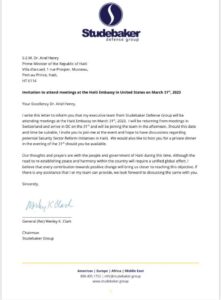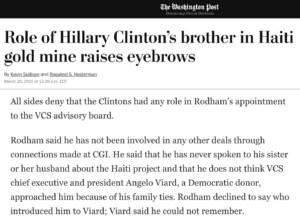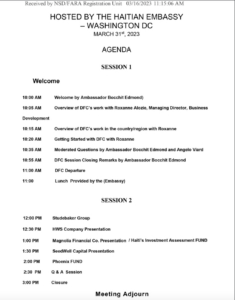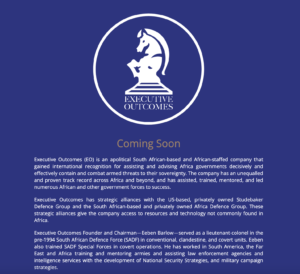Article • Haiti Watch
Haitian Authorities Quietly Met with Defense Contractor, Former US General

Article • Haiti Watch
Fact-based, data-driven research and analysis to advance democratic debate on vital issues shaping people’s lives.
Center for Economic and Policy Research
1611 Connecticut Ave. NW
Suite 400
Washington, DC 20009
Tel: 202-293-5380
Fax: 202-588-1356
https://cepr.net
In late March, Wesley Clark, a retired four-star US military general and one-time Democratic presidential candidate, reached out to Haiti’s de facto prime minister, Ariel Henry. Clark was writing as chairman of the Studebaker Defense Group, a multinational security contractor that includes many former Pentagon and CIA officials among its ranks, and invited Henry to join him for a business meeting at the Haitian Embassy in DC on March 31, 2023.

“I invite you to join me at the event and hope to have discussions regarding potential Security Sector Reform initiatives in Haiti,” the retired general wrote in the letter, obtained by HRRW. “We would also like to host you for a private dinner in the evening of the 31st should you be available.”
Henry did not travel to DC, but the embassy did host an event on March 31 where Studebaker officials and other private sector actors were present, according to a draft agenda contained in a Foreign Agent Registration Act (FARA) disclosure. The registered lobbyist, Angelo Viard, filed the paperwork in mid-March, stating that he had been authorized to work on behalf of Prime Minister Henry. The documents indicate that Viard, a Haitian-American businessman and the former CEO of VCS mining, is performing the work on a volunteer basis and that he had also helped organize a meeting between Henry and private sector actors last year in Miami.

First on the agenda for the March 31 meeting was a presentation and Q and A session with Roxanne Alozie, director of business development at the US International Development Finance Corporation (DFC), a government entity that “partners with the private sector to finance solutions to the most critical challenges facing the developing world today,” according to its website. Later in the day, there were presentations from the Studebaker Group as well as HWS, Magnolia Financial Co., Seedwell Capital, and the Phoenix Fund.

“DFC staff regularly conducts presentations to interested business communities, including diaspora and affinity groups, to explain how DFC works,” Pooja Jhunjhunwala, a spokesperson for DFC, explained in a written statement. “The March 31 event was hosted and managed by the Embassy of Haiti.” Bocchit Edmond, Haiti’s ambassador, did not respond to a request for comment.
Though neither Clark nor Henry ended up personally attending the embassy event, five days later, Clark and other Studebaker officials traveled to Port-au-Prince where they met with the de facto prime minister in the airport’s diplomatic salon. The meeting was confirmed by both Studebaker and a spokesperson for the prime minister. “The purpose of the discussion was to discuss potential Haiti security reform initiatives,” a Studebaker official explained. “We currently have no formal relationship with the government of Haiti or with Mr. Angelo Viard,” they added. The prime minister’s spokesperson did not provide any further details of the meeting or what was discussed.

The meeting occurred roughly seven months after Henry formally asked the international community to lead a military intervention in Haiti. Those calls, however, have thus far failed to translate into any concrete action, despite public support from the US and UN. Earlier this month, media outlets reported on leaked US intelligence documents that claimed the Russian state-affiliated Wagner Group “planned to discreetly travel to Haiti to assess the potential for contracts with the Haitian government to fight against local gangs.” A Haitian government official told the Miami Herald that there had been no meetings with the Wagner Group, and the leaked documents contain no actual evidence of their presence in Haiti.

Interestingly, in 2021, Studebaker Defense Group formed a partnership with a notorious South African mercenary group, Executive Outcomes. The group, founded by Eeben Barlow, a former Colonel in the Apartheid-era South African Defense Forces, was active across the African continent, as well as in South America and Asia, until they closed in the late ‘90s. Barlow reconstituted Executive Outcomes in 2020. He now sits on the board of Studebaker Defense Group, where he is listed as “Strategic Advisor Africa.” According to Intelligence Online, the partnership was intended to create a rival to the Wagner Group, which is also present in Africa.

This is not Clark’s first foray into Haiti as part of the private sector. Less than a month after the 2010 earthquake, Clark traveled to Haiti and met with then-president René Préval in order to give “a sales presentation on a hurricane/earthquake resistant foam core house designed for low income residents,” according to a diplomatic cable released by Wikileaks. Clark sat on the board of the company, InnoVida Holdings, which eventually received a $10 million loan from the US Overseas Private Investment Corporation, the predecessor of the DFC. The company, however, never built any houses. In 2012, InnoVida’s CEO, Claudio Osorio, was arrested on fraud charges. He eventually plead guilty and was sentenced to 12 years in prison for bilking investors of some $40 million and making false representations in the OPIC loan application.
Years later, Clark told the press that, despite being listed as a board member of InnoVida, he had only been recruited to join the board before eventually declining. “I’ve learned that when it smells, get away,” Clark said at the time.